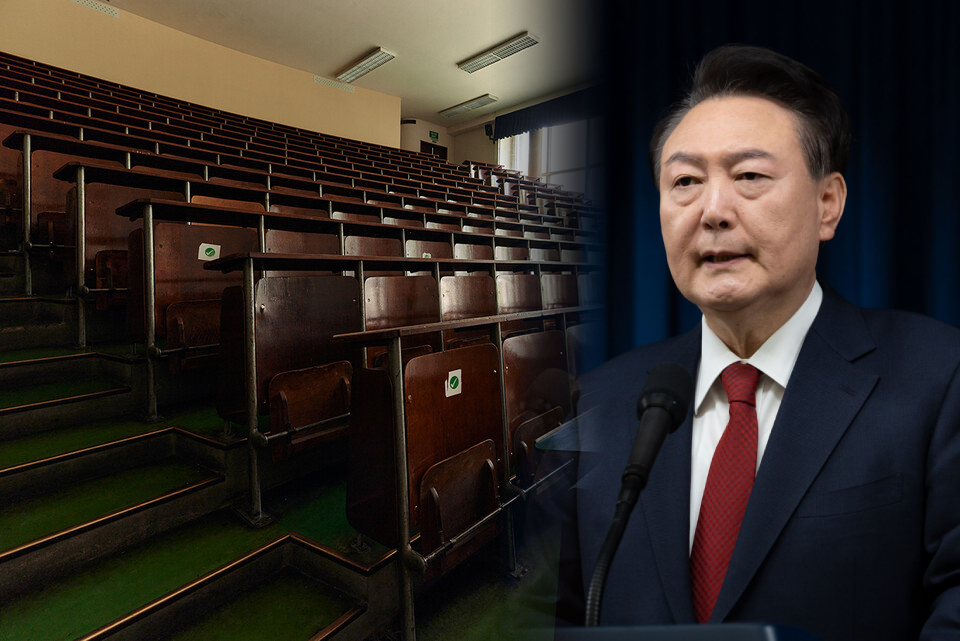
The Constitutional Court has scheduled the impeachment ruling on President Yoon Suk Yeol for 11 a.m. on Friday. According to the medical community, whether or not the impeachment is upheld is expected to significantly impact Yoon's plans to increase the medical school enrollment quota and other healthcare policies.
Whether or not Yoon is impeached will affect his medical school expansion and healthcare reform programs.
On Feb. 6, 2024, the Yoon administration abruptly announced that it had decided to increase the number of medical students by 2,000. Minister of Health and Welfare Cho Kyoo-hong made the announcement after the first Healthcare Policy Review Committee meeting.
“To push forward healthcare reform in a situation where essential medical care is on the brink of a precipice and to increase the number of doctors by 10,000 by 2035, it is necessary to expand the number of medical students, which has been tied at 3,058 for 19 years since 2006, by 2,000 from the 2025 academic year,” Cho said.
The medical community immediately pushed back and took collective action. Trainee doctors left the medical field in mass resignations, and medical students boycotted classes and took a mass leave of absence. While some medical students have recently returned to school after continued pressure from the government, trainee doctors and medical students who left the field have not yet returned and are confronting the government.
Despite fierce opposition from the medical community, the Yoon administration pushed to increase the number of medical school students and formed a special committee on healthcare reform.
In August 2024, the government announced the first action plan, which included establishing a sufficient and fair compensation system to strengthen essential medical care, building a medical safety net, and managing unreimbursed treatment.
On March 19, it announced the second action plan, which included fostering regional secondary hospitals and strengthening primary medical care to strengthen local medical care and normalize the delivery system; proper management of unreimbursed treatment to establish fair compensation and rational improvement of accident insurance; and establishing a medical accident safety net that both patients and medical professionals trust.
Accordingly, since October last year, a support project for the conversion of the structure of the tertiary general hospitals has been underway at all high-level general hospitals nationwide, and a comprehensive secondary class project for regional general hospitals will be launched soon.
In addition, various policies are being promoted, such as prohibiting reimbursed and unreimbursed medical treatment for cosmetic and plastic surgery purposes, requiring medical institution operators to purchase liability insurance, and establishing a medical accident review committee.
However, the Constitutional Court's decision will also likely affect these healthcare reform policies.
If Yoon is not impeached and returns to work, the medical school capacity expansion and healthcare reform policies will be pushed harder than they are now.
Given Yoon's strong antipathy toward the medical community, which included the “execution of trainee doctors” in Decree No. 1 of the short-lived martial law, medical community sources say it cannot be ruled out that the medical school enrollment quota increase and healthcare reform policies will be pursued more harshly than now.
In contrast, if the Constitutional Court decides on Yoon's impeachment, the medical school capacity expansion and healthcare reform programs will lose momentum and must be significantly revised. Accordingly, the impeachment of Yoon is expected to increase calls from the medical community for both policies to be scrapped.
A professor at a national university hospital strongly criticized the Yoon government’s healthcare policy.
“Increasing the number of medical students and other unilateral healthcare reform programs are aimed at harassing a specific profession, which is similar to regional discrimination and targets students and specialists,” the professor told Korea Biomedical Review over the phone.
“If they don’t want to ruin our country, these policies should be completely scrapped (following the impeachment of President Yoon), and the estimation committee should discuss the number of medical school students,” he said. “The number of students should be increased to the level that each region and training hospital can afford, not arbitrarily increased without any scientific basis.”
“If we increase the number of medical school students when there are not enough trainee doctors in provincial university hospitals, many of the graduates will end up going to Seoul and its vicinity,” he said. “Increasing the number of medical school students when the population is reduced and the size of the hospitals is shrinking will only increase the number of doctors moving to Seoul.”
Another professor at a provincial university hospital said, “The medical school capacity increase and the healthcare reform policy could be pushed as hard as they were because of President Yoon. If the Constitutional Court decides to impeach President Yoon, the wrong policies should be revisited and revised in a big way.”

